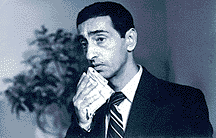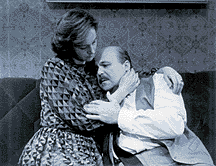
September 1993 (1.3)
Pages 30-31
Rasim Ojagov
Film
Director
_____
Rasim Ojagov is one of Azerbaijan's
foremost con-temporary flm directors. He was one of the most
productive directors in the former Soviet Union and has directed
many of the screenplays of Rustam Ibrahimbekov, a well-known
Azerbaijani flmwriter. In this interview, Mr. Ojagov describes
how he got involved with flm, what the conditions were like working
in the Soviet system and what the situation is like today for
Azerbaijani cinema .
Mr. Ojagov has recently produced a flm called "Tahmina"
with Ojag Studio, his own independent studio" in Baku. In
the near future, Ojagov and Ibrahimbekov plan to work together
on a flm about Azerbaijanis when they immigrate abroad to Turkey,
Europe and the U.S.,a modern tragic-comedy.
Rasim
Mualim, first of all, how did you come to be a film director?
I was born in Shaki.
I'm a "Shakian". Although Shaki is a small city, it's
beautiful. It's truly an Azerbaijani city. Shakians usually exaggerate
the beauty of their city, but Shaki is, indeed, a pretty town.
In my school days in Shaki, I wanted to become a geologist. In
those days, oil was the main issue in Azerbaijan. In all the
papers, the cinemas, everywhere, it was petroleum...petroleum.
Oil workers were like heroes. But then when I was in the 8th
grade, a flm crew came to Shaki and I was mesmerized. I fell
in love with flm-making, bought a camera, and from then on cinema
became my only hobby.
When I graduated from high school in 1951, I went to the Film
Institute in Moscow. Back home, they weren't very happy about
it. "ACTING! That's not for you! You should have gone to
the Petroleum Institute." But I had already made up my mind.
After graduating, I came back to Baku. Generally, when a young
man frst graduates, he thinks he's going to change the world,
and since I was from Shaki, I had an ego twice that size. I really
used to think I was going to revolutionize Azerbaijani cinema.
But after working as a cameraman for a long time, I wanted more
and more to become a director. I could not get on very well with
the director. We always quarreled. He would said, "Hey,
I'm the director and I want to flm it this way. You have to do
it the way I want it."
This was not satisfying to me. That was why I went back to study
flm directing in the Faculty of the Kino Theater (Cinema Theater)
in Baku. In 1965 I graduated but at that time there were few
flms being produced because of the immense costs involved - 400,000
to 500,000 rubles.
Then an opportunity came. Sayedzade was making a flm in Azerbaijan
- "Qatir Mammad." For some reason he was not able to
fnish it. But as the government had already spent a lot of money,
they couldn't just leave it unfnished. They called me and said
that there was only 100,000 rubles left and that it had to be
fnished in two months. I had no option but to agree.
Anyway, I fnished the job within budget in a month and a half.
The audience welcomed it. Moscow liked it and from then on, they
gave me flms. Since then I've been working as a director in Azerbaijan
flm studios and have made 10 major flms and four or fve short
ones.
You know...Soviet cinema was a massive industry. There were 15
republics and each had its own cinema. Apart from that, Russia
itself had many flm studios. Azerbaijani cinema was only a small
part of the whole thing. Of course, Azerbaijani cinema never
reached the level of Georgian cinema. Whenever anyone talks about
Soviet cinema, they usually think of Georgian and Russian flms,
not Azerbaijan flms.
How would
you compare Azerbaijani films with other former Soviet films?
You know...Soviet cinema
was a massive industry. There were 15 republics and each had
its own cinema. Apart from that, Russia itself had many flm studios.
Azerbaijani cinema was only a small part of the whole thing.
Of course, Azerbaijani cinema never reached the level of Georgian
cinema. Whenever anyone talks about Soviet cinema, they usually
think of Georgian and Russian flms, not Azerbaijan flms.

 I cannot say that
Azerbaijani cinema was so highly developed in those days but
when compared to other flm studios, it was by no means lagging
behind.
I cannot say that
Azerbaijani cinema was so highly developed in those days but
when compared to other flm studios, it was by no means lagging
behind.
Let me give you an example, Moscow - Most Studios - made 70 flms
a year. In Azerbaijan, we made only four. So in one year, Moscow
produced what Azerbaijan did in ten years. However, if we take
the good flms out of those 60-70 flms, then and only then can
you have realistic comparison.
Haji Ismayilov in Ojagov's "Alien Life"- 1987
Our films are not well-known
abroad because it was up to Moscow to send them abroad and Moscow
didn't know our cinema very well. Maybe we, ourselves, didn't
publicize them well enough.
Why have
so few classical works - other than "Mashadi Ibad"
and "Arshin Malalan" been produced in Azerbaijan?
That's not exactly true.
First of all, the frst "Arshir Malalan" was produced
in 1945 right after the war. People had new hopes. From 1945
to 1955, only two or three flms were produced in Azerbaijan,
but then again in the same period, only 10-15 were produced in
the entire Soviet Union with a population of 200 million. This
was because most of the people who had been involved in flm had
left for the war.
But during the second half of the 50s, Azerbaijani flm slowly
came to itself. Young people returned from the war and entered
the Institute so that in 60s we witnessed a flm revival. You
must not be familiar with the flms of the 60s; we had some really
fne works then.

 Alexander Kalagin
and Irina Kupchenko in Ojagov's "Alien Life" - 1987
Alexander Kalagin
and Irina Kupchenko in Ojagov's "Alien Life" - 1987
Which flms
of the 60s do you consider the best?
For example, "Two
Boys from the same Neighborhood", "On the Far Shores",
"In a Southern Town", "A Telephone Operator Girls"
and many others. In one word, the 1960s were the golden years
of Azerbaijani cinema.
Many young energetic people were involved - screen writers like
the Ibrahimbekov brothers, Anar, Yusif Samadoghlu; and directors
like Eldar Quliyev, Arif Babayev and Hasan Sayidbeyli - all very
progressive. Prior to that Tofq Tahizadeh, Azhdar Ibrahim-bekov
and Seyedzadeh - they were all heavy weights in Azerbaijani cinema.
We were all so hopeful about the future of Azerbaijani cinema
back then.
To me, your
own flms all seem to be quite critical of the Soviet bureaucracy.
How diffcult was it to get those kinds of flms released?
It wasn't easy. I have
always been interested in problematic themes - the analysis of
people's psychology in their environment. Rustam Ibrahimbekov's
screen writing is the same - you know, we worked together for
such a long time.
Starting with "Interrogation", I have tried to show
the system's corruption, prejudice and the hardships of life
under it. This was all done, of course, within the limited possibilities.
The government fnanced the flms but then said, "Make your
flm but don't touch me." So we couldn't say a thing. Everything
had to be pictured nicely; our policy, our communist party, our
offcials. In other words, nothing negative. And that simply meant
that making a realistic flm was very diffcult.
My flms faced a lot of diffculty in getting through Moscow. They
only accepted them for one reason. They said, "Well he's
just talking about Azerbaijan...let him be as long as he doesn't
bother us." But one could not criticize Moscow's affairs
- that would have meant the end of the project. I can say that
I have always tried to tell the truth within the limits of the
Soviet screen and this, of course, created diffculties. Now of,
course, there are no political restrictions. But there's no money
either.
What
is the situation right now in Azerbaijani cinema?
Azerbaijani's flm industry
is in a pathetic situation. It's so sad. You see, in the past,
the government used to fnance us. We made flms and the government
distributed them. Now the government has forgotten us. They say,
"Now we have a market economy. Go and fnd sponsors for yourself.
Make your own movie. Sell it yourself. Make the proft for yourself."
But this can only happen in big countries (I'm not referring
to US cinema which has captured the world market) - but countries
like France and Russia which have huge markets within their own
borders. But in Azerbaijan, with a population of only 7 million,
given the current cost of film-making, it is impossible for us
to make a proft.
Therefore, if the government doesn't realize the importance of
cinema, it will diminish. Of course, now we're at war; the government
is busy with more serious matters and nothing else seems to be
important for people. Nevertheless, cinema should not be forgotten
as movie culture is one of the major aspects of contemporary
culture.
It's been two years since a flm has been made in Azerbaijan.
The government doesn't sponsor flm and, therefore, it's impossible
to fnd private investors. Businessmen realize that they will
not get a return; in fact, they won't even recover their costs
so they don't come near flm.
So what is the future of flm-making in Azerbaijan? We have more
than 1,000 flm specialists in our flm industry. It took time
to train them and now they are all leaving. If our government
doesn't start supporting us today, after 5 or 10 years, it's
going to be too late. We'll have to re-build all these establishments
from scratch. We have described our situation to the government
and they have given some promises. We'll see.
Rasim Ojagov was interviewed in Azeri in Baku by Pirouz Khanlou in February 1993.
The English translation
is by Abulfazl Bahadori.
From Azerbaijan International (7.4) Winter 1999.
© Azerbaijan International 1999. All rights reserved.
Back to Index AI 1.3 (September
1993)
AI Home
| Magazine
Choice
| Topics
| Store
| Contact
us
|
|